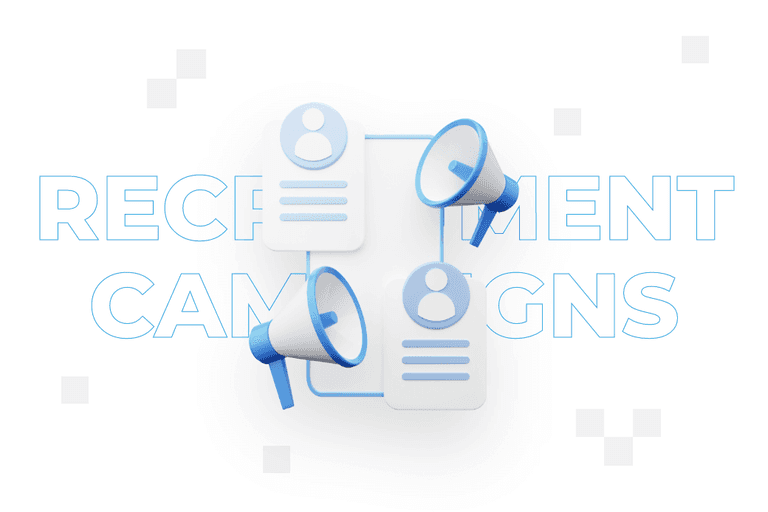Table of contents
- Recruitment campaign – definition
- Impact of employer branding on recruitment campaigns
- The impact of recruitment campaigns on the candidate experience
- Features of a good recruitment campaign
- Elements of a recruitment campaign
- Creating recruitment campaigns
- Costs of recruitment campaigns
- Challenges of recruitment campaigns
- Benefits of recruitment campaigns

Recruitment campaigns – what are they and how to conduct them?

Recruitment campaigns are an integral part of the hiring process in modern organisations, aiming to attract and select the most suitable candidates. How to effectively plan, implement and analyse recruitment campaigns to achieve the best results?
From this article you will learn:
- What is a recruitment campaign?
- What are the relationships between a recruitment campaign and employer branding?
- How does candidate experience affect recruitment campaigns?
- What distinguishes a good recruitment campaign?
- What does a recruitment campaign consist of?
- How to create a recruitment campaign?
- What affects the cost of a recruitment campaign?
- What difficulties can be expected during recruitment campaigns?
- What can be gained from recruitment campaigns?
Recruitment campaign – definition
A recruitment campaign is a structured and purposeful process designed to attract qualified personnel to an organisation. It is more than just a series of job advertisements; it is a comprehensive strategy involving identification of company needs, planning, targeting, communication, as well as analysis and optimisation.
A recruitment campaign is a planned and organised set of activities designed to attract and select candidates to work for an organisation.
What is a recruitment campaign?
A successful recruitment campaign not only fills current staffing gaps, but also has a positive impact on long-term business goals and corporate image as an attractive employer. Recruitment campaigns mainly focus on talent acquisition and have specific performance indicators, such as time to hire and quality of applications.
Impact of employer branding on recruitment campaigns
A recruitment campaign and employer branding are two key elements of human resources management that, although different, are closely related. A recruitment campaign is a process aimed at attracting new employees. Employer branding is a long-term strategy to build a positive image of the company as an attractive employer. Activities in this area affect not only recruitment, but also talent retention and the overall organisational culture in a company.
Employer branding influences the perception of the company on the labour market and among employees, which can significantly facilitate the recruitment process. Properly planned and executed recruitment campaigns can reinforce the employer brand, which in turn can significantly facilitate the recruitment and retention of top talent. Success in one area often translates into success in another, creating a synergistic relationship that benefits multiple levels of the organisation.
The impact of recruitment campaigns on the candidate experience
Candidate experience refers to the candidate’s overall experience and impressions during the recruitment process. How he or she is treated, how fast and transparent the process is, and even how easy it is to find job information and apply, all affect the candidate’s experience. If these are negative, even the most effective and well-planned recruitment campaign may not be successful. On the other hand, a positive candidate experience can significantly facilitate recruitment, as well-treated applicants are more likely to accept job offers and also recommend the company to others.
Candidate experience affects a company’s long-term image as an employer. Recruitment campaigns can be temporary and goal-oriented, whereas attention to candidate experience is a permanent part of any recruitment process and impacts your brand as an employer for years. When managing the recruitment process, this aspect cannot be overlooked. Every touchpoint between a candidate and a company, from the job advert to the final recruitment stage, has an impact on their experience and overall impression of the company. A good recruitment campaign should support a positive candidate experience.
Features of a good recruitment campaign
A good recruitment campaign must first and foremost be targeted, such as filling specific vacancies or attracting talent from a specific area. Targeting a specific target group is key, although the means can vary from social media to traditional forms of advertising. Another important feature is consistency with the overall brand strategy. This means that the messages and language used in the campaign should be in line with your company values and culture. This not only facilitates identification with the company, but also builds trust among potential candidates.
Another important aspect is transparency and clarity of communication. Candidates value clearly defined expectations, procedures and timelines. Ambiguity can lead to frustration and negative experiences, which will ultimately affect the effectiveness of the campaign. Also, innovation and creativity should distinguish a good recruitment campaign. In the age of digitalisation and social media, traditional recruitment methods may not be enough, and the use of gamification or the use of advanced data analytics tools can improve results.
Last, but not least, is the ability to measure and analyse results. This includes both campaign performance tracking tools and KPIs that can be used to optimise future activities. A recruitment campaign that has the elements listed above not only attracts the right candidates, but also serves the company’s long-term goals, such as building a strong employer brand and maintaining high levels of engagement among employees.
Elements of a recruitment campaign
The elements of a recruitment campaign are diverse and can vary depending on the goals and specifics of the organisation. However, there are a few basic components that are commonly used within such campaigns:
- The job advert is one of the most important elements of the campaign and the most popular recruitment method. It should be clear, precise and well-worded. The job description, requirements and terms and conditions of employment are the basic information that must be included.
- Communication channels are another important aspect. These range from traditional methods, such as newspaper advertisements, to modern tools, including social media, job websites or email marketing. The choice of channels should be tailored to the target group.
- Employer branding, although often treated as a separate issue, is an indispensable part of any recruitment campaign. All materials and communications should be consistent with the company’s overall image and values.
- The selection and recruitment process is not only the initial CV screening stage, but also interviews, tests and possible candidate assignments. This is crucial for assessing the skills and competences of applicants.
- Analysis and monitoring tools are also important to measure the effectiveness of the campaign and possibly make adjustments. This can include different types of indicators, such as the number of applications, the quality of candidates or the time it takes to complete the recruitment.
- Last, but not least, is communication with candidates. Adequate feedback, updates on the progress of the recruitment process and clear messages are key to a positive candidate experience and can influence their decision to accept an offer.
Creating recruitment campaigns
Creating recruitment campaigns is a multi-step process that requires careful analysis, planning and execution. Managing a recruitment campaign is a continuous learning process and adapting to the changing conditions and needs of both the organisation and the labour market.
Identifying goals and needs
The first step in creating a recruitment campaign is to precisely define the organisation’s objectives and needs. At this stage, HR and department managers analyse which positions need to be filled and what their specificities are. Requirements for candidates, such as technical skills, experience or soft skills, are also identified. The initial analysis not only helps to target the right campaign to the right target group, but also allows attractive and precise job advertisements to be created. It also lays the foundation for further activities in the recruitment campaign.
Analysis of the labour market and target group
The next step is to analyse the labour market and understand where and how your target group is looking for jobs. Do they use traditional job portals or do they actively follow social media? The answers help you choose the most effective communication channels. At the same time, it is useful to understand the expectations and needs of candidates regarding the positions on offer. This can range from salary to development opportunities or company culture. Understanding these aspects will allow you to better tailor your offer to candidates’ expectations, ultimately increasing your chances of attracting the right people.
Campaign planning
Planning is the time when specific activities are arranged in a logical and effective structure. Decisions on budget are key at this stage, as well as the choice of tools and platforms to be used for the campaign. Alongside this, a campaign timeline is created, which determines when and how the various campaign elements will be launched. All the necessary recruitment materials are also prepared – job adverts, social media posts and any additional promotional materials are developed to catch the attention of potential candidates and encourage them to apply.
Campaign implementation
During implementation, the previously developed plans and strategies are put into action. Pre-prepared job advertisements are then published on selected platforms, social media activities are launched and an email campaign is initiated. Each of these elements must be in line with the previously adopted plan and schedule. In this context, it is extremely important to maintain consistency in communication and employer branding across all channels. This not only helps to build trust among potential candidates, but also makes it easier for them to identify and remember the offer. Consistency and professionalism at this stage are crucial to the success of the entire campaign.
Analysis and summary
During the analysis, all data on the performance of the campaign is collected. Analytical tools and a variety of indicators, such as the number of applications, the quality of candidates applying or the duration of the entire recruitment process, are used to measure the effectiveness of the campaign. If you notice that certain elements of the campaign are not delivering the expected results, this is the time to make adjustments.
The final stage, evaluation and debriefing, occurs after the campaign has ended and is used to reflect on its effectiveness. On this basis, conclusions are formulated that can be used in future campaigns. It is also an opportunity to reflect on how the results of the recruitment campaign fit into the broader employer branding strategy. This not only allows future recruitment campaigns to be refined, but also influences the optimisation of the overall employer branding strategy. In this way, each campaign becomes not just a single project, but part of the company’s long-term strategy.
Costs of recruitment campaigns
The cost of recruitment campaigns is a complex issue and is influenced by various factors. Among the most important are:
- the choice of communication channels on which ads will be published,
- the cost of analytical tools and applicant tracking systems,
- remuneration of the HR team or external agency for running the campaign,
- creation of promotional materials,
- paid advertising,
- time spent on screening and interviewing.
The question still arises as to what is more cost-effective for your business – running the campaign in-house or outsourcing it to a marketing agency, both approaches have advantages and disadvantages. Running a campaign in-house gives you more control over the process and can be more cost-effective if you already have the right tools and skills in the team. However, it can also mean that human and time resources are dispersed, which can affect other company activities.
Outsourcing a campaign to a marketing agency, on the other hand, often involves higher upfront costs, but can deliver better results in the short term due to the specialised know-how and tools that the agency has. It also reduces the burden on the internal HR team. The disadvantage can be less control over the process and a potential divergence from the company’s long-term strategy if the agency is not fully integrated into the organisation’s objectives. The final choice depends on the specifics of your company, its needs and resources.
Challenges of recruitment campaigns
Recruitment campaigns are often fraught with challenges that can affect their effectiveness and ultimate success. One of the main problems is reaching the right target group. The job market is dynamic and competitive, with many companies vying for the attention of the same candidates. Another aspect is budget. Limited financial resources can significantly affect the scope and quality of a campaign, and companies often have to balance cost and efficiency, which requires precise planning and monitoring.
Time management is another challenge, especially when the campaign is complex and multi-stage. Every element, from the preparation of materials to the selection of candidates, requires attention and time, which can be a problem if human resources are limited. Consistency of communication and brand image is also a significant challenge. All elements of the campaign must be consistent with the company’s overall strategy and image. Any inconsistency can affect brand perception and discourage potential candidates.
Last, but not least, the challenge is to analyse and measure the effectiveness of the campaign. Without the right tools and indicators, it is difficult to accurately assess which elements of the campaign are most effective and which need to be optimised.
Benefits of recruitment campaigns
A well-planned and effective recruitment campaign can significantly increase the reach of job offers, touching a larger and more diverse group of potential candidates. This not only increases the chances of finding the ideal employee, but also builds brand awareness as an attractive employer in the market. Recruitment campaigns are also a way to attract candidates with specialist skills or competencies.
These campaigns are also an excellent opportunity to promote the company culture and values, which is key to employer branding. A well-run campaign can influence the perception of a company not only by potential candidates, but also by existing employees and the wider market environment.
From the candidates’ point of view, recruitment campaigns are also a benefit. This is because they make it easier for them to familiarise themselves with job vacancies and the company’s culture, making it easier to make informed choices about their future career path. Finally, it is also worth mentioning that effective recruitment campaigns reduce the time it takes to recruit new employees, which is beneficial from both a cost and an operational efficiency point of view for the company.
FAQ
Contact form
Develop your brand
Rate content:
You may be interested in:




